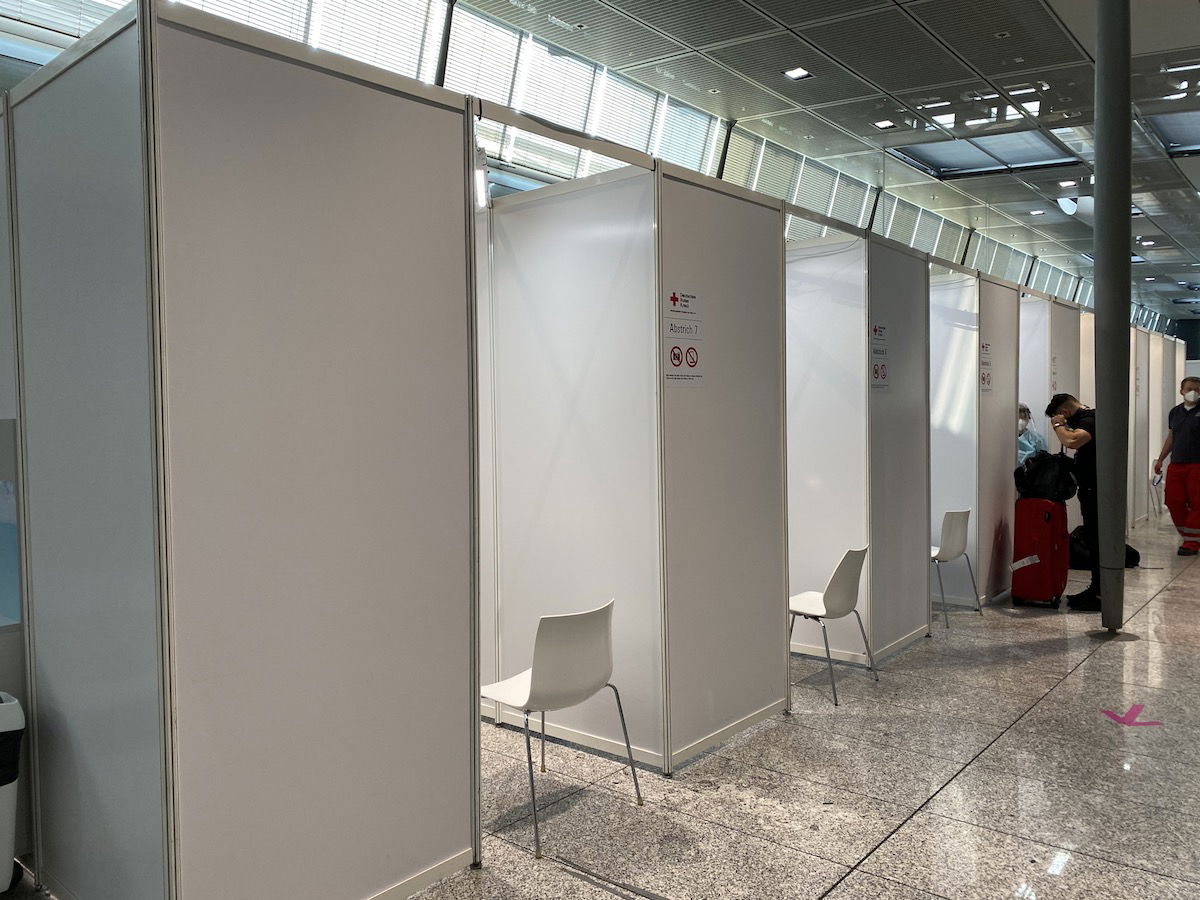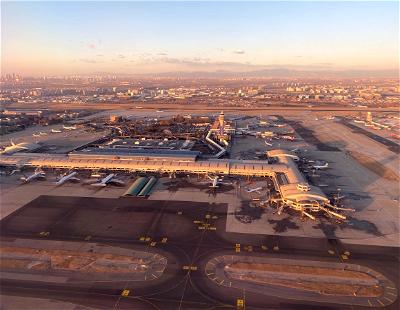There has been a lot of talk in the travel industry about the relative effectiveness of self-quarantine vs. testing when it comes to opening up travel. A new study has just been published that factors in something that I think is otherwise often overlooked.
In this post:
Is quarantine less effective than testing?
New research has been published by Edge Health and Oxera, which suggests that the UK government’s 14-day self-quarantine policy for international arrivals is far less effective than previously thought, and is less effective than any sort of testing program.
While the UK has a travel ban altogether during its lockdown, previously the country required a 14-day quarantine when returning from a high risk country, with no option to take a test in place of the quarantine.
The primary reason this is said to be ineffective is because people fail to adhere to the full period of quarantine.
The study suggests that:
- Only 71% of symptomatic individuals adhere to a 14-day quarantine
- Only 28% of asymptomatic individuals adhere to a 14-day quarantine
The research uses the metric of “infectious days,” referring to the number of days where someone is potentially infectious and out in the community. It draws the following conclusions:
- The current 14-day quarantine system reduces infectious days by just 25%
- A single test on arrival would reduce infectious days by 51%
- A single test 72 hours before travel would reduce infectious days by 36%
- A single test 72 hours after returning to a country would reduce infectious days by 60%
The study suggests that the most effective option is to test three days after returning to a country, to strike the right balance between ensuring sufficient time for coronavirus to become detectable, and a swift enough result to inform the non-compliant infected individuals in the community of their status.
It’s suggested that if there had been testing on arrival in August 2020, the presence of coronavirus on arrivals from the EU would have been just 0.01%, compared to estimates of UK community transmission being 0.57% during the months of September and October.
 Is a test on arrival more effective than a quarantine?
Is a test on arrival more effective than a quarantine?
Why I find this research to be valuable
Let me start by saying that I think this research overlooks some things and has some flaws, but I appreciate that it generally addresses a point that governments seem to overlook — people largely ignore the 14-day self-quarantine.
Obviously they shouldn’t, but they do. For example, New York has had a 14-day self-quarantine (there’s now an option to test out of it), yet I can’t even begin to count the number of people I’ve seen who have openly violated this on social media (and that doesn’t account for all the people doing it more subtly).
Yet when it comes to public policy discussion, that’s almost never considered. The question shouldn’t be how effective a 14-day quarantine is vs. testing on arrival, but rather how effective a 14-day quarantine is adjusted for people violating it, compared to testing on arrival.
Now, there are a few things worth acknowledging here:
- The research uses data from Norway regarding people skipping quarantine, so it’s anyone’s guess how that maps over to other countries; personally I’d be shocked if the numbers were significantly better in New York or the UK
- The research was funded by Virgin Atlantic, Heathrow, and others, so obviously there’s a motive behind this
- Countries requiring “real” quarantine in facilities (basically jailing you for two weeks) are a different story, since you’re much less likely to violate this
- The study doesn’t address the extent to which fear of a 14-day quarantine is a deterrent to travel; in other words, people who do end up traveling may not follow the 14-day quarantine, but how many people decide not to travel due to fear of having to quarantine for 14-days (I think this number is significant)
 How many people are actually obeying a 14-day quarantine?
How many people are actually obeying a 14-day quarantine?
Bottom line
We’ve seen quite a bit of research about the effectiveness of a 14-day quarantine in conjunction with travel. Obviously travel brands have been trying hard to undo this, but they haven’t been successful in many countries.
While I think there are flaws in the research, it’s still refreshing to see some math that accounts for the fact that many people don’t follow 14-day quarantine requirements if they’re not enforced.
With the exception of countries where coronavirus is completely under control, I can’t figure out why some places are so opposed to better testing protocols rather than a full 14-day quarantine.
Am I the only one who has noticed the extent to which people openly skip mandatory quarantine when there’s limited enforcement? Can you make sense of why this isn’t factored into more research?





Self quarantine or mandatory quarantine does not matter. The reason people don't participate is because there is nothing to control them. There are no sensors or monitoring, it is based entirely on the honesty system. That does not work. Some people don't think they have symptoms or are sick. The reason that the quarantine does not work in these places is because of this.
Next is regarding the so-called lockdowns. Last time I checked lockdowns...
Self quarantine or mandatory quarantine does not matter. The reason people don't participate is because there is nothing to control them. There are no sensors or monitoring, it is based entirely on the honesty system. That does not work. Some people don't think they have symptoms or are sick. The reason that the quarantine does not work in these places is because of this.
Next is regarding the so-called lockdowns. Last time I checked lockdowns do not include going out to work or school, visiting friends, getting haircuts, or going to bars if you order food not just drink and you are home by a certain time. Some countries definitions of lockdown sounds so free.
We can't assume that all of the tests are accurate too. Elon Musk had 4 tests recently. Two came back positive, two negative....
From what I understand , how a 2 week at home quarantine is managed differs from place to place. Typically here in Adelaide, on arrival from the one Australian state still considered here at risk of covid19 hotspots, you would be assessed if best to put you in a "medi-hotel" if your living situation is shared with people coming and going. If you are allowed to do home quarantine the police would call in at...
From what I understand , how a 2 week at home quarantine is managed differs from place to place. Typically here in Adelaide, on arrival from the one Australian state still considered here at risk of covid19 hotspots, you would be assessed if best to put you in a "medi-hotel" if your living situation is shared with people coming and going. If you are allowed to do home quarantine the police would call in at 2 or 3 random times during the 2 weeks. Also they would phone you up at random times to ask what you are doing.. eg. "I'm watching TV" and then you would be asked which channel are you watching and what's on. Naturally you would be required to attend testing a few times during the 2 week quarantine. That's followed up on if you don't attend. Of course, international arrivals are a different matter and that's prioritised in getting Australians home as we expect troubled times ahead. Overall , I'm satisfied with what is in place here, as I'm seeing it only impacts those travelling from hotspots, and the rest of us here can get on with our ordinary life.
@David, In case it is news to you, here you go. https://www.channelnewsasia.com/news/world/covid-19-australia-open-borders-asia-third-day-no-local-case-13507318
Japan is floated in the list and it certainly does not look good. Singapore government has talked about the aims so many times, it may have fallen on deaf ears.
@2PAXfly
Why does Australia have to compare with US, one of the worst handlers of virus crisis?
If Australia was so good at test and trace, why locked down Melbourne and the state of Victoria? Why not just quarantine, test trace like any other state in Australia? I pity people of Victoria.
Read the news. Morrison floated the idea of travel bubbles with some Asian countries. Though I have doubt about it.
Quarantine, don't quarantine. Viruses are gonna virus. You can't control it, only mitigate the effects. Lockdowns lower the rate of spread but once you reopen it will surge. Even a three year lockdown will result in a surge in day one of year four. I guess Australia is in it for several years. Good luck with your economy, mental health, public unrest, etc. I doubt all that is worth the cost.
@Freedom and others
The Australian strategy has worked well. It has reduced the virus to controllable proportions. Local outbreaks are identified, and transmission traced. Genetic testing and sewerage monitoring are also used to identify hotspots so testing can be concentrated.
Testing stations are everywhere in Australia and it's the better PCI test, and it's free. At Bondi Beach, you can even do a drive-through in between surfs!
In Australia, from 22 January to 12...
@Freedom and others
The Australian strategy has worked well. It has reduced the virus to controllable proportions. Local outbreaks are identified, and transmission traced. Genetic testing and sewerage monitoring are also used to identify hotspots so testing can be concentrated.
Testing stations are everywhere in Australia and it's the better PCI test, and it's free. At Bondi Beach, you can even do a drive-through in between surfs!
In Australia, from 22 January to 12 November 2020, 9,268,481 tests have been conducted yielding a positive rate of 0.3%. That's for a population of 25 million (health.gov.au). In the USA 'till 27 August tests were 79,611,982 on a population of 330 million with a positive rate of 9%! (CDC)
Australia's plan has not been perfect - note the Ruby Princess cruise ship incident in Sydney where infected passengers disembarked and quarantine hotels in Victoria, where inadequate supervision let the virus infect security guards and the general community ending in months of lockdown.
Government, business, and politicians want to bring back international travel, but only from destinations with low levels of the virus. Quarantine, testing, tracing, and monitoring are part of the Prime Minister's plan. Morrison has said general international travel is unlikely to resume until a vaccine is available.
So there is a plan.
The Australian government does not share my political stripe - but even I have to say they have done a pretty good job of taking and implementing scientific advice on this pandemic.
Oh, and wear a mask.
@freedom
Why does it matter what they’re aiming for (which I suspect you’re making up anyways, given the fact that you keep making claims that are factually incorrect)? The point is they have similar rates of new cases are all in agreement in terms of what a safe number is, and are all ready to close back up if numbers grow. Also, Japan does not belong in that list.
@David @CoolHandLuke
I just read news yesterday. Scott Morrison wants to open travel to some Asian countries, including Singapore, Hong Kong, Japan. These countries don’t look to eliminate the virus, but to control the spread. Sooner or later, travellers from these countries will bring in the virus.
That will work well.
@Freedom. I'm not sure you are absorbing the information on the Australian response given here. Perhaps you should re-read.
I would add that probably the major reason it had been so successful is that the politicians (for once) privately knew this was something they knew nothing about and left it to the various Chief Medical Officers to handle, letting them take the flak should problems arise. Clever.
Aspects of border closures, and returning...
@Freedom. I'm not sure you are absorbing the information on the Australian response given here. Perhaps you should re-read.
I would add that probably the major reason it had been so successful is that the politicians (for once) privately knew this was something they knew nothing about and left it to the various Chief Medical Officers to handle, letting them take the flak should problems arise. Clever.
Aspects of border closures, and returning residents has been widely criticised as, you can guess, State premiers, and last but not least, the Prime Minister, who has a not entirely stellar background in PR/sales, have all thought they know best. lol.
@freedom
Exit strategy is a vaccine (haven't been watching the news?) or for other countries to get their shit together. Your faulty reasoning could basically apply to any pandemic ("just don't quarantine! What's the exit strategy?")
@mh @CoolHandLuke @Ed
It is not just about controlling local community transmission. What’s the exit strategy? Close the external border until everyone beats the virus?
When the external border is open without mandatory quarantine, some positive cases will happen in community and spread like wild fire. What’s Australian strategy to manage that? Go to lockdown again? Good luck with that.
Melbourne could have been a successful example of managing the virus without lockdown. But it...
@mh @CoolHandLuke @Ed
It is not just about controlling local community transmission. What’s the exit strategy? Close the external border until everyone beats the virus?
When the external border is open without mandatory quarantine, some positive cases will happen in community and spread like wild fire. What’s Australian strategy to manage that? Go to lockdown again? Good luck with that.
Melbourne could have been a successful example of managing the virus without lockdown. But it went the east way.
Worth also pointing out that we quarantined the entire state of Victoria with strict enforcement and we have had NOT A SINGLE CASE OF COVID-19 FOR 14 DAYS.
If you want to beat the virus - STAY HOME.
@Freedom. Anyone who wishes to be tested can do so at numerous testing centres. No waiting, results quickly. Anyone displaying even minor cold-like symptoms is encouraged to test. Because cases are ultra low (aircraft arrivals mainly) contact tracing (primary and secondary) is easily done keeping a lid on any possible spread.
There have been only 800 or so deaths nationwide since the virus arrived early this year.
Freedom,
When you reliably quarantine your only inputs for the virus then it virtually removes transmission.
It is only when you don't manage what you have properly, plus allow further incoming spread, that enables further community spread.
The research confirms the obvious.
That is why it supports the outcome that quarantine should be tested (i.e. monitoring) and/or secured i.e. quarantine station/hotel lockdown for the required period, with severe penalties for breaking it.
Any administration doing less is just governing poorly.
@ CoolHandLuke
Who is being tested today in Australia? I know the incoming passengers are being tested. But who else? Has Australia started to test the community in large actively? To understand its capacity to test as well as the robustness of the community tests.
This is not the first time that Australia has low to none community spread. Melbourne did not test out community spread in the last wave, just went straight to quarantine....
@ CoolHandLuke
Who is being tested today in Australia? I know the incoming passengers are being tested. But who else? Has Australia started to test the community in large actively? To understand its capacity to test as well as the robustness of the community tests.
This is not the first time that Australia has low to none community spread. Melbourne did not test out community spread in the last wave, just went straight to quarantine. Is Melbourne actively testing community in large to confirm low or no community spread? Or just go the Thailand way?
@Freedom~What are you talking about? Testing in Australia is readily available with no delay in getting results. It is totally free too.
Many states have had no community-transmitted cases whatsoever for weeks now (months for some) and the few cases from overseas arrivals undergo compulsory 14 day hotel quarantine. There is no option for testing within that 14 days to reduce the time in quarantine.
The few arrivals are returning Australians and a...
@Freedom~What are you talking about? Testing in Australia is readily available with no delay in getting results. It is totally free too.
Many states have had no community-transmitted cases whatsoever for weeks now (months for some) and the few cases from overseas arrivals undergo compulsory 14 day hotel quarantine. There is no option for testing within that 14 days to reduce the time in quarantine.
The few arrivals are returning Australians and a restricted number of other permit holders. It is even difficult for residents to return with bottlenecks created by the federal government.
Overseas tourism is currently dead/nonexistent and will remain so for a long while.
Funny how NY ranted at FL for asking NYers to quarantine. Yet NY is now doing the same.
I don't follow your conclusion from this study, that testing would help on arrival. The Norwegian study with all its flaws (not answering questionnaire truthfully, low participation in study etc.) concludes that people don't follow the quarantine rules. So if someone tests on arrival and is told to quarantine instead of just being told to quarantine anyway, why are they more likely to adhere to the rules?
Better, insist on tests before traveling (e.g....
I don't follow your conclusion from this study, that testing would help on arrival. The Norwegian study with all its flaws (not answering questionnaire truthfully, low participation in study etc.) concludes that people don't follow the quarantine rules. So if someone tests on arrival and is told to quarantine instead of just being told to quarantine anyway, why are they more likely to adhere to the rules?
Better, insist on tests before traveling (e.g. the rapid tests being trialed by some airlines now) to catch some before they travel and enforce quarantine rules more strictly if they are used (e.g Australia).
One interesting observation out of the Norwegian study. 72% of 18-29 year olds followed the quarantine rules. It's the 50-69 year olds with 24% adherence who are in the bad books...
@John
There are serious questions about the study you cited (for example, extrapolating extensively from outbreaks that have little to do with COVID 19 and have vastly different methods of transmission), but even assuming there is some value in the study, the conclusion is obvious: better policy obviously increases adherence, but it should be even more abundantly clear that proper enforcement would increase adherence the most.
In many successful countries in Asia, breaking home quarantine...
@John
There are serious questions about the study you cited (for example, extrapolating extensively from outbreaks that have little to do with COVID 19 and have vastly different methods of transmission), but even assuming there is some value in the study, the conclusion is obvious: better policy obviously increases adherence, but it should be even more abundantly clear that proper enforcement would increase adherence the most.
In many successful countries in Asia, breaking home quarantine means being sent to a facility for the rest of the quarantine, that obviously helps with adherence much more than any policy. You're also drawing conclusions from the study where there is none, as strictness of enforcement isn't even one of the factors being examined.
So the issue isn’t that quarantine is ineffective it is that people are selfish.
As you quote from the report
“ Only 71% of symptomatic individuals adhere to a 14-day quarantine
Only 28% of asymptomatic individuals adhere to a 14-day quarantine”
What this says is that self enforced measures are ineffective and enforcement needs to be more effective.
It’s notable that the countries that have low incidence of the virus either have...
So the issue isn’t that quarantine is ineffective it is that people are selfish.
As you quote from the report
“ Only 71% of symptomatic individuals adhere to a 14-day quarantine
Only 28% of asymptomatic individuals adhere to a 14-day quarantine”
What this says is that self enforced measures are ineffective and enforcement needs to be more effective.
It’s notable that the countries that have low incidence of the virus either have strong social pressure and adherence to social norms or strong enforcement of isolation. It’s not difficult, people need to stay home, minimum use contact with each other and stop looking to dodge the rules until such time as we have an effective vaccination programme. Big emphasis on effective epigram because we need high levels of vaccine uptake for it to be effective.
I don't even understand why any real research needed to be done to come to this conclusion. Of course testing would be more effective! I'm no expert but I've been saying all along that 14 day quarantines are completely unreasonable and unrealistic. Just based on simple numbers, you would assume that a large majority of passengers would be negative anyway. Just looking at the US, only 3% of the population has been infected with known...
I don't even understand why any real research needed to be done to come to this conclusion. Of course testing would be more effective! I'm no expert but I've been saying all along that 14 day quarantines are completely unreasonable and unrealistic. Just based on simple numbers, you would assume that a large majority of passengers would be negative anyway. Just looking at the US, only 3% of the population has been infected with known cases so extrapolating that to an airplane full of 300 people, you're quarantining 300 people when only 9 people (or less probably) need to be. Testing would allow tourism to largely resume and to do so pretty safely.
I believe the real intent of the “mandatory” 14-day quarantine is to discourage travel. As for the scant compliance, I am not a bit surprised, and frankly can’t believe there is any compliance at all in countries which do not have good enforcement. The cost for leisure and business travelers to be hole up in a hotel for 14 days is prohibitively expensive. Hopefully, this quarantine discussion will become moot with the release of the...
I believe the real intent of the “mandatory” 14-day quarantine is to discourage travel. As for the scant compliance, I am not a bit surprised, and frankly can’t believe there is any compliance at all in countries which do not have good enforcement. The cost for leisure and business travelers to be hole up in a hotel for 14 days is prohibitively expensive. Hopefully, this quarantine discussion will become moot with the release of the vaccines early next year. I haven’t heard anything about how proof of COVID vaccines will be handled with respect to entering foreign countries and hopefully they work that out. As someone who had COVID in February and who travels to the EU monthly for work, I can attest to the fact that PCR testing prior to departure (I test out of quarantine fortunately) and the other numerous restrictions in each country with closures, ground transportation problems and radically reduced flight capacity makes it all a very unpleasant and stressful experience.
I’m placing all my faith in the vaccines at this point if we are ever to return to the good ole days of 2019 and before. In the meantime, I hope the airlines, hotels, restaurants and all other travel industry concerns can hang on a little longer.
@Ross - are people not flying to Turkey for funsies anymore?
Ben you're missing the other big point that quarantines actively reduce the number of people travelling which merely requiring a test won't.
So it is also about the number of people times the percentage. So 3 times more people travelling is actually worse than the non-compliance.
Remove the quarantine, have tests and see more people travel leads to more infections being introduced. A new chain of infections is about 20x worse than a pre-existing local...
Ben you're missing the other big point that quarantines actively reduce the number of people travelling which merely requiring a test won't.
So it is also about the number of people times the percentage. So 3 times more people travelling is actually worse than the non-compliance.
Remove the quarantine, have tests and see more people travel leads to more infections being introduced. A new chain of infections is about 20x worse than a pre-existing local chain case.
Of course just way better to be Australia, NZ, Taiwan, Thailand and Vietnam and use your resources to enforce quarantine. Australia and NZ's data essentially shows the more people let in from countries the more cases imported-it is actually extremely predictable based on where people are flying from and the current prevalence rates of those countries.
The problem with many “successful” countries or territories such as Thailand, Vietnam and Taiwanese that they don’t have the community test capacity. Hardly these countries can handle even a small wave. Australia is a good example, from hero to nothing. Hopefully Australia now has the capacity to test and manage community spread.
Angela, your friend just sounds irresponsible. Anyone flying into the U.K. right now with a modicum of awareness would know about quarantine.
Harvard's School of Public Health published a paper recently saying the 3 biggest spreader events are restaurants, gyms and hotels.
One copy is at:
https://www.statnews.com/2020/11/10/restaurants-gyms-were-spring-superspreader-sites-occupancy-limits-could-control-spread/
I think the main question is whether the goal of quarantines and testing is to completely eliminate the risk of importing a disease, or merely to mitigate/reduce the risk.
If the former, the only way to truly achieve it is full quarantine (not self-quarantine). This in turn has other social and economic impacts, but it is an option for governments and societies to choose.
If the latter, you accept that there will be a...
I think the main question is whether the goal of quarantines and testing is to completely eliminate the risk of importing a disease, or merely to mitigate/reduce the risk.
If the former, the only way to truly achieve it is full quarantine (not self-quarantine). This in turn has other social and economic impacts, but it is an option for governments and societies to choose.
If the latter, you accept that there will be a certain number of "imported" cases, but do the best you can to reduce this number to a level where your available track/trace and treatment infrastructure can absorb these.
I was involved to some extent in the implementation of the latter protocols in Ghana a few months ago. The intention, as conveyed by public health officials, was never to hit zero cases, but rather to mitigate the impact of potential imported cases when borders were reopened without a mandatory quarantine requirement.
The protocol in Ghana is a two-step testing process. A traveler must obtain a laboratory PCR test no more than 72 hours prior to commencing their journey, and then a second rapid antigen test is carried out upon arrival in Ghana prior to clearing immigration. The test on arrival takes between 15-30 minutes to complete (a full scale laboratory has been set up at the airport with approx. 600/hour testing capacity). The test results are linked to passport details via a web portal accessible on mobile, and immigration/port health cross check the double negative test results before granting entry. Those who refuse to undergo testing on arrival are treated as suspected positive cases and sent to a treatment/isolation facility until they either agree to provide a test sample, or until 14 days have passed.
In the first 2 months of this protocol with approx. 54,200 passengers arriving, the protocol intercepted 172 passengers who tested positive upon arrival, and a further approx. 11 who tested negative but who subsequently tested positive in the community within the following 14 days (this is not necessarily indicative in itself of an imported infection as this could also be due to exposure following arrival). The initial target was a 99.4% success rate at level 1 (airport interceptions) and 99.9% at level 2 (community interceptions), but the system is presently delivering approx. 99.7% success rate at level 1 and approx. 99.98% at level 2.
As far as the authorities in Ghana are concerned, this has been a success. There are still a fractional amount of infections getting through, but the ability to manage these is within the capacity of the healthcare system. The benefits from opening up borders under these protocols have been deemed to outweigh the mitigated risks.
Certainly, every country is different and has different priorities, healthcare capacity and risk appetite. These protocols work well for Ghana given the set of circumstances there. If more countries took a similar practical approach to developing a local set of protocols that work for their unique situation, there would be significantly less discontent among their citizenry and also begin the first steps towards embracing a "new normal".
My husband has a friend who lives in the US and his wife lives in London. He flew over there about a month ago and was prepared to quarantine for 2 weeks. When he returned he told my husband that no one even mentioned quarantine to him and therefore he did not self-quarantine. He said he believed they were no longer requiring it but I imagine that is a lie because his wife surely knew...
My husband has a friend who lives in the US and his wife lives in London. He flew over there about a month ago and was prepared to quarantine for 2 weeks. When he returned he told my husband that no one even mentioned quarantine to him and therefore he did not self-quarantine. He said he believed they were no longer requiring it but I imagine that is a lie because his wife surely knew the rules, they just knew they could get away with it. The point being, no enforcement probably means a lot of people are not following the rules.
@David @D3kingg
There is actually evidence that factors other than enforcement affect the likelihood of people sticking to quarantine:
- Knowledge about the rules/provision of clear instructions (clearly an issue in some European countries including England)
- Social norms
- Perceived benefits of quarantine
- Perceived risk of passing on the disease (i.e., people are more likely to stick to quarantine rules if they think there is a high chance they may...
@David @D3kingg
There is actually evidence that factors other than enforcement affect the likelihood of people sticking to quarantine:
- Knowledge about the rules/provision of clear instructions (clearly an issue in some European countries including England)
- Social norms
- Perceived benefits of quarantine
- Perceived risk of passing on the disease (i.e., people are more likely to stick to quarantine rules if they think there is a high chance they may infect others)
- How practical is quarantine (how easy is it to obtain food, medicine, supplies etc.?)
There is a peer-reviewed meta-study "How to improve adherence with quarantine: Rapid review of the evidence" which clearly suggests information about the disease, the rules, and the response is highly significant. I think you're not even close to telling the full story when suggesting it is all about enforcement.
I think people did follow the 14-day quarantine guidelines back in the spring when nothing was open outdoors anyway except grocery stores and pharmacies. Now that restaurants, gyms, and other places have reopened. a good number of people haven't obeyed the quarantine for sure in places that have limited enforcement.
I agree that a significant number of people are preferring not to travel due to the 14-day quarantine (enforced or not enforced) upon return back home.
@David
You beat me too it
@John
East and SE Asia has high adherence partially because you are required to download and keep a tracking app installed, have daily calls to check on you, hotel or quarantine facilities mandatory (where there is monitoring) and finally strict enforcement if you breach quarantine.
It’s not just a matter of people’s willingness to adhere. There needs to be strict enforcement.
I think the issue is you cannot extrapolate from the these results to other countries. I see England one one side of the spectrum (extremely low adherence to quaratine rules) and East and SEA countries on the other side of the spectrum (high adherence).
Consider England. My relatives there keep telling me that adherence to all kinds of policies was and remains poor. The inconsistent messages sent by the government (remember "eat out to help...
I think the issue is you cannot extrapolate from the these results to other countries. I see England one one side of the spectrum (extremely low adherence to quaratine rules) and East and SEA countries on the other side of the spectrum (high adherence).
Consider England. My relatives there keep telling me that adherence to all kinds of policies was and remains poor. The inconsistent messages sent by the government (remember "eat out to help out" or Johnson refuting the necessity of a second lockdown mere days before announcing it) are likely a factor in this. Furthermore, England changed from voluntary self-adherence to covid measures to (at least in theory) enforcable ones that rely on fines and such very late in the game.
It's sort of similar in the US. The US pandemic playbook (written over the course of 15 years by Republicans and Democrats alike) specifies that a clear and coherent communication strategy is critical. But obv, nobody adhered to the "unified message" the playbook called for. In many US states, governors contradicted the covid measures instituted by majors. Trump refuted what the CDC said. Etc.
Obv, a lot of things are at play, not just communication plans and enforcability of covid restrictions. E.g., "pandemic fatigue" is a bigger issue in Western countries than in East Asian countries where people are more willing to adhere to social rules. Nevertheless, I think there something to my initial claim that you can't generalize from these finding.
What kind of tests is used? Self-administrated or professional administrated PCR tests?
According to a study by King's College, quarantine adherence by those who had been alerted that they had had a contact with someone with covid-19 (so should have quarantined, as I understand it) was around 11%.
https://www.kcl.ac.uk/news/effective-test-trace-and-isolate-needs-better-communication-and-support
The other thing worth considering is that this “research” was commissioned (ie, paid for) by Heathrow Airport and Virgin Atlantic, among others and, doubtless entirely coincidentally, it supports their policy position while trashing the current policy (which they strongly oppose).
What a shock.
@ The nice Paul -- Oh, you're absolutely right, it's clear this is intended to have a certain outcome. Though I still appreciate that it addresses what virtually all the other research and studies seem to overlook, which is people blatantly violating quarantine when there's no enforcement.
This is why Australia does not provide this option at present - mandatory 14 day hotel quarantine. And it works - Australia has an average of 1.1 local cases per day. We are picking up something like ten times that from people returning from overseas.